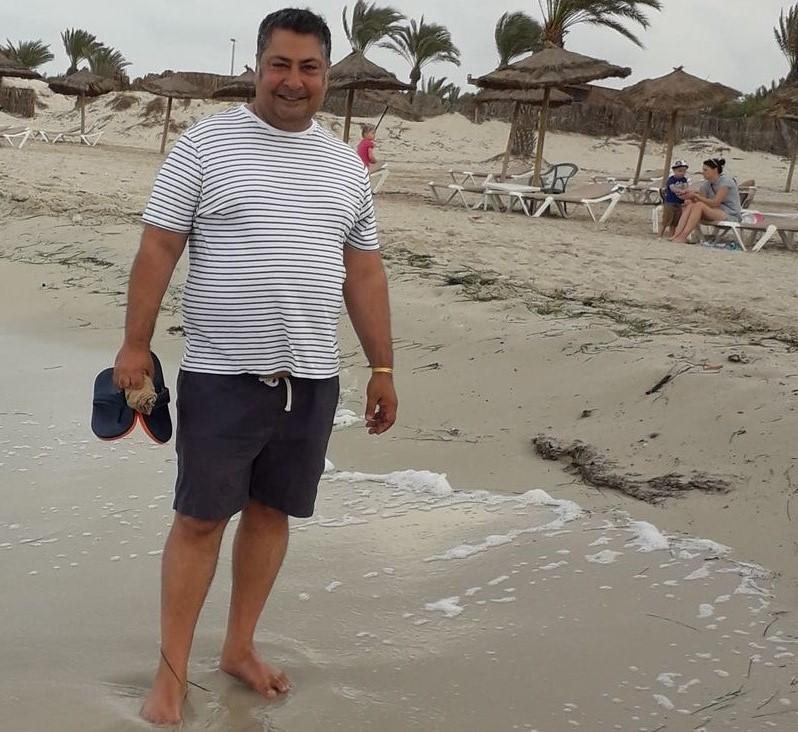Imtiaz
Imtiaz talks about his diagnosis of central nervous system (CNS) lymphoma.

I’m Imtiaz and this is my cancer journey. I call it a journey because with luck, perseverance and self-determination, I am not simply the passenger, but the driver.
Nearly 3years ago, when I was 46, I was diagnosed with an aggressive non-Hodgkin lymphoma in my brain. The symptoms had been there for about six months; I had become forgetful and was constantly feeling tired. I honestly have no recollection of this period.
The diagnosis was mind-blowing, but I didn’t panic. Getting cancer is not what I would wish on anyone, but I have learnt so much about myself through this.
I was told they would need to start treatment with chemotherapy almost immediately. As I sat on the hospital bed I realised how real it was. I looked around the ward and saw that it was filled with men of all ages, all of us sharing the same reason for being there. Over time I got to know some of them, as well as the clinicians and healthcare teams.
I have been asked how I coped, especially as mine was a particularly difficult type of lymphoma to treat. The truth is that I was 46 years old and had a good life with a fantastic partner, amazing brothers and sisters and a wondrous mother who has sadly passed but had inspired me with her fortitude and strength. I had a great family. Compared to the younger people who I met who were dealing with their own treatment, I felt that I had been so fortunate to have got this far without a major illness. It made me appreciate more than ever what I had.
During chemo I had no appetite and I could feel my body reacting to it. Looking at my fingers, the skin on them was tight like sausages and my body and face swelled up. I had horrible dysentery and I was always tired, but I knew I had to take it.
I'd watch people go by in cars, buses, cycling or on foot. I thought to myself how lucky they were just getting on with their lives.
Sometimes I would go out for fresh air and sit outside the hospital, still attached to a drip. I’d watch the people go by in cars, buses, cycling or on foot. I thought to myself how lucky they were just getting on with their lives.
My partner Aga was amazing. She’d get up at 6am to go to work and then come to see me in hospital at 6pm and stay until 9.30pm. I have six sisters and two brothers and my wonderful family would come and visit; the pick-up they gave me was amazing.
In the latter part of my treatment I was told I would need a stem cell transplant. Stem cells come from the marrow in your bones. In my case they drilled into my pelvis to extract them which I have to admit was painful. As my final chemo would destroy my immune system, the stem cells would eventually provide me with a new immune system. But as my immune system was rebuilding itself, it would also make me vulnerable to catching infections.
My fourth and final chemo was the strongest, causing my hair to fall out and a lot of sickness. My weakened immune system meant that I had to avoid infections, so I spent a month on an isolation ward.
In this ward there was a brass bell with a plaque that said patients ring it three times when their treatment is complete. It was a signal to the other patients that they too could do it.
My treatment continued, but at the end the consultant said I was free to go. It didn’t really sink in. My cancer was gone.
Only as we were leaving the hospital, I realised there was something I needed to do. I walked to the bell, took hold of the string and gave it the loudest clang I could. I wanted to let the other patients know I had made it. The doctors and nurses came into the corridor to see who was walking out and I can’t express how grateful I was for their help.
Stepping out of the hospital was a lovely sunny day, but I felt low. I was questioning why it was I was allowed to survive. I learnt from the nurses and counsellors that this is known as ‘Survivor’s Remorse’ and is when you are filled with guilt for making it through.
The weeks passed and I could not shake off this low feeling. I was referred to a Macmillan counsellor. I think having it explained to me helped enormously. Returning to my family home was an amazing time and being there with all my brothers and sisters was magical.
Finishing cancer treatment was perhaps the easy part. My whole body and mind had tired.
Finishing cancer treatment was perhaps the easy part. My whole body and mind had tired. The Macmillan counsellor said it can take years to get back to my original mojo level as everyone is different. I’m getting there.
What this experience taught me was to appreciate life, music, nature and everything around me. It has also taught me that although we may fall out with each other over stupid things, it is important to iron things out.
I have been in remission for about two and a half years. I know that my cancer can come back. If it does, I’ll be ready.
3 March 2021
